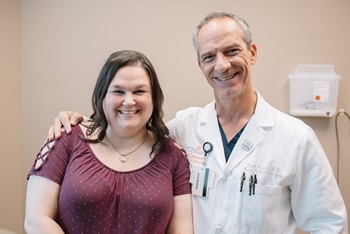
Moseley is one of a growing number of adults ages 54 and younger being diagnosed with colorectal cancer (CRC). According to a 2023 report published by the American Cancer Society (ACS), nearly double the number of adults under the age of 55 are being diagnosed with colorectal cancer now than a decade ago—despite a drop in the incidence of CRC in the general population.
Lifestyle factors play a role
What’s behind this alarming trend? Colon and rectal surgeon Mark. J. Pidala, MD, who is affiliated with Memorial Hermann, says, “Although the exact cause is not yet completely understood, experts point to significant changes in U.S. lifestyle over the last 50+ years.”
Among the potential culprits are increasingly sedentary lifestyles, the dramatic increase in obesity/metabolic syndrome in the U.S. and the substantial change in diet from more whole and natural foods to fast foods, processed foods and sugars.
Dr. Pidala says that while genetics are involved in CRC, cannot solely be attributed to genetic factors. Moseley’s half-sister was diagnosed with colon cancer at age 31, a year and a half before Moseley’s diagnosis, yet genetic testing showed that Moseley had no “known” genetic abnormalities that would predispose her to rectal cancer. “Her history—the fact that there are two family members diagnosed with CRC in their 30s— highlights the fact that there are certainly aspects of genetics that we still do not understand,” he says.
Mortality rates linked to later-stage diagnoses
The ACS report also showed that CRC mortality rates are also increasing among individuals younger than 50 years of age, despite a modest decrease in CRC mortality rates in adults ages 50+. This may be due, in part, to the fact that many younger patients are diagnosed later in the progression of the disease, when it’s harder to treat. According to the ACS report, stage at diagnosis is the most important factor in survival; overall survival is highest in individuals ages 50-64 years because they are most likely to be diagnosed at a localized stage—35% versus 26% of individuals younger than 50 years of age.
Dr. Pidala says these later diagnoses among younger patients might be attributable to the general lack of CRC screening before the age of 45 (the U.S Preventive Services Task Force recommends screenings begin at age 45; age 40 (if there’s a family history of CRC) and/ or to younger adults’ propensity to ignore symptoms. “Younger patients are not even thinking about the ‘C-word’ when they develop symptoms, even when they see visible blood in their stool, which they often attribute to ‘hemorrhoids,’” he says.
He also cites “the embarrassment factor” (“Younger patients seem more reluctant to see a doctor for bowel, rectal or anal issues out of embarrassment.”) and a lack of awareness of these CRC trends among primary care physicians. “Primary care physicians can also attribute symptoms to hemorrhoids in the younger population because they may not be aware of the increasing trends of CRC in younger patients,” he says.
Multidisciplinary team approach
Fortunately, Moseley did not ignore her symptoms, nor did her primary care physician, who referred her to a gastroenterologist who performed an endoscopy and colonoscopy. Based on the results of the colonoscopy, he referred Moseley to Dr. Pidala. Her work-up revealed stage III rectal cancer. Rectal cancer often requires a combination of chemotherapy, radiation and surgery. In addition to Dr. Pidala, Mosely’s care team includes medical oncologist Andrew Jackson, MD, and radiation oncologist James Zhu, MD, both of whom are affiliated with Memorial Hermann The Woodlands Medical Center.
Memorial Hermann The Woodlands is accredited by the American College of Surgeons as a National Accreditation Program for Rectal Cancer (NAPRC). The NAPRC program was developed to improve the care of rectal cancer patients in the U.S. by standardizing care and creating a multidisciplinary approach, both of which have been shown to improve patient outcomes, says Dr. Pidala.
A standard NAPRC practice is for each patient’s case to be presented before a multidisciplinary team called a tumor board. Colorectal cases are presented to the tumor board at Memorial Hermann The Woodlands at diagnosis and again post-surgery. The team collaborates to develop an optimum treatment plan for each patient. Moseley’s plan included radiation and chemotherapy to shrink the tumor. If all goes as planned, upon completion of Moseley’s pre-surgery treatments, Dr. Pidala will perform surgery to remove the cancerous tissue and the surrounding lymph nodes.
Strong support system
Dr. Pidala says Moseley has a great attitude and a strong support system. “Her husband accompanies her to office visits and is very engaged in our discussions,” he says. “And she is very optimistic and has a great sense of humor. I believe this positive outlook often affects patients’ outcomes in a favorable way.”
Education and outreach needed
Despite these concerning trends, there is hope. “CRC is curable with screening and early detection,” says Dr. Pidala. “This is why it is imperative to educate not only the community at large but all physicians who may be primary caregivers to these young patients. Bleeding should not be ignored, either by the patient or the physician,” he says emphatically.
Moseley concurs: “I’ll tell anyone. If you have symptoms, go get checked out, and the sooner the better.”
Click here to learn more.